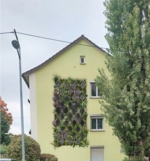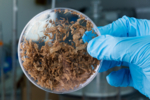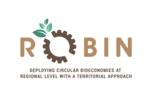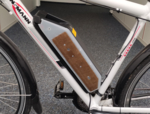-
Press release - 02/11/2023
The Sustainability Innovation Campus (ICN) initiated by the University of Freiburg and the Karlsruhe Institute of Technology (KIT), which will begin its work in January 2024, has announced a two-year funding programme for start-up projects. Scientists from the University of Freiburg, KIT and cooperating universities and research institutions are invited to submit their project outlines by 30 November 2023.
https://www.biooekonomie-bw.de/en/articles/pm/sustainability-innovation-campus
-
-
-
-
-
-
-
-
Press release - 25/04/2023
Roboticists at the Max Planck Institute for Intelligent Systems in Stuttgart have developed a jellyfish-inspired underwater robot with which they hope one day to collect waste from the bottom of the ocean. The almost noise-free prototype can trap objects underneath its body without physical contact, thereby enabling safe interactions in delicate environments such as coral reefs. Jellyfish-Bot could become a tool for environmental remediation.
https://www.biooekonomie-bw.de/en/articles/pm/jellyfish-robots-could-one-day-clean-worlds-oceans
-
-
-
Valorization of biological materials - 12/01/2023
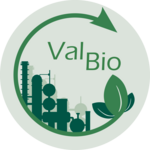
Reducing carbon dioxide emissions and the capture and utilization of CO2 are important steps towards achieving a climate-neutral and sustainable economy. Accordingly, as part of the ValBio-Urban research project, an interdisciplinary team from the University of Stuttgart is developing bioeconomic approaches to solutions that will be implemented with companies from Baden-Württemberg.
https://www.biooekonomie-bw.de/en/articles/news/valbio-urban-brings-bioeconomy-research-users
-
Press release - 15/12/2022
The launch of the global Nature Positive Universities initiative was announced at the UN Biodiversity Conference (COP 15), held in Montreal, Canada, in December 2022. The University of Konstanz is one of more than one hundred universities from all five continents joining the initiative. The common goal is to address the university's own impact on nature and to identify and implement effective measures to halt and reverse the loss of…
https://www.biooekonomie-bw.de/en/articles/pm/verantwortung-uebernehmen-zum-schutz-der-biodiversitaet
-
-
-
Lentil cleaning - EIP-AGRI Rhizo-Linse project - 26/04/2022
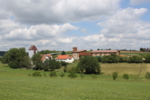
The Altdorf mill, just under 7 km south of the city of Böblingen, has operated lentil cleaning facilities since 2019, the year that the Sessler mill in Renningen, 20 km further north, ceased all operations including lentil cleaning. After receiving a number of enquiries from farmers and local mills, brothers Karl and Jörg Ruthardt took a chance and launched a lentil cleaning operation in addition to their mill and farm shop business.
https://www.biooekonomie-bw.de/en/articles/news/lentil-cleaning-altdorf-mill
-
Press release - 06/04/2022
The University of Stuttgart is contributing to innovations for climate protection as part of the EU project "Smart Circular Bridge". An old material is being rediscovered: flax has been with us for thousands of years in the form of clothing, sacks, and robust ship's ropes. Now the plant fibres are experiencing a renaissance and could become the building material of the future.
https://www.biooekonomie-bw.de/en/articles/pm/high-tech-bruecke-mit-flachs-gebaut
-
Filament winding technology for sustainable construction - 06/04/2022
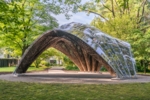
One of the greatest challenges in the construction industry is the transition to more environmentally friendly and resource-saving buildings. Researchers at the University of Stuttgart are combining state-of-the-art robotic filament winding technologies with ancient local crops to produce stable and sustainable lightweight structures from flax fibres.
https://www.biooekonomie-bw.de/en/articles/news/robotic-building-natural-fibres
-
-
-
-
Press release - 12/01/2022
Chitin is the main component of insect carapaces and ensures that they are both stable and flexible. The Chitinfluid research project, funded by the Carl Zeiss Foundation, focuses on the use of chitin in construction and aims to process chitin and its derivatives into sustainable materials. In a hybrid symposium under the auspices of Prof. Sabine Laschat from the University of Stuttgart, the project team discussed the current state of research…
https://www.biooekonomie-bw.de/en/articles/pm/insect-carapace-sustainable-building-material
-
-
Press release - 09/07/2021
Refuels are renewable fuels that can be produced in different ways. When they are mixed and processed such that they meet the existing fuel standards, they are suited for all types of combustion engines. This is the result of the latest vehicle and fleet tests within the project “reFuels – Rethinking Fuels” at Karlsruhe Institute of Technology (KIT). Compared to fully fossil fuels, refuel mixes allow for a CO2 reduction by 25% at least. Moreover,…
https://www.biooekonomie-bw.de/en/articles/pm/refuels-are-suited-wide-use
-
Start-up kernique catch the zeitgeist - 29/06/2021
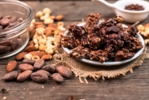
A delicious vegan nut snack that uses no sugar, artificial additives, gluten or palm oil, is full of essential nutrients, and is part of a commitment to environmental and social sustainability. Impossible? An Esslingen-based start-up called kernique proves otherwise. The start-up is currently planning a crowdfunding phase that offers a lucrative deal for investors. The idea catches the zeitgeist, but what exactly makes it stand out?
https://www.biooekonomie-bw.de/en/articles/news/nut-snack-sustainable-ecological-concept
Website address: https://www.biooekonomie-bw.de/en/search
